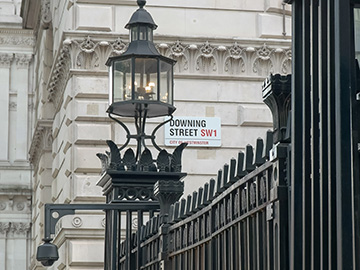![]()
[Image: Getty Images]
On Thursday, 12 December, the Conservative government in the United Kingdom won a decisive election victory, gaining scores of seats and a solid hold on power in Parliament. The election result is widely viewed to have broken the logjam on the U.K.’s long delayed exit from the European Union—and, more generally, to have redrawn the kingdom’s political map.
To get an initial reading on the possible implications for photonics in the U.K., OPN talked with John Lincoln, the head of the U.K. Photonics Leadership Group, an organization that advocates for the U.K. industry.
It’s been three and a half years since we first talked with you about the Brexit vote—and, to put it mildly, a fair amount has happened since then. What’s your initial thinking on the outcome of the recent U.K. election and its high-level implications for photonics in the U.K. and Europe?
At the top level, we have a Conservative government returning with a much larger majority than most people expected. And what that means in short order is, we can expect Boris Johnson’s Brexit bill to proceed through Parliament without any delay, and in the shortest timeframe possible. So, almost without a doubt, the U.K. will formally start the process of leaving the European Union on the 31st of January.
That introduces a great deal more certainty than would have been possible in almost any other election outcome. And it will move us into the next stage in terms of the U.K.’s relationship with Europe—negotiating a future trade agreement.
So from the standpoint of, “Do we know where it will leave us in the next few months?”—absolutely. We now know where it will leave us, and we know the process and the timescale in which that will happen. From an industry point of view, it removes that first unknown.
But it does not remove all unknowns because it’s only the start of the process. It does not define the details of the future trade agreement with Europe, or even the details of subtleties like our participation in Horizon Europe and European collaborative research and development. Those are part of the trade negotiation for the future.
As you suggest, this is a beginning as much as it’s an end, given that the U.K. and the EU will now enter negotiations in this transition period. Boris Johnson has just declared that would seek legislation ruling out an extension to that transition after the end of 2020. That seems to put things on a pretty aggressive time frame.
Well, the exact time it will take to negotiate a trade deal is a thing that is being hotly debated. There are many stories in the news that it will take longer than a year; the new government has said that they would very much like it to take place within the year.
I believe the essential response to whether it’s possible in a year is that most commentators agree that it depends on the complexity of the trade deal you try to negotiate. The more it is different from the status quo, the harder it is to do in a year.
It’s very difficult to say at this point what will be the sticking points of that negotiation in a year’s time. And how much they may impact photonics, for example, is a very interesting question. Because the impact to any particular industry is secondary or third-level in those trade negotiations.
OK—granted that, though, are there any guideposts we might use to think about what sort of things, in such a U.K.–EU trade agreement, might have some tangible impact on photonics?

[Image: Courtesy of J. Lincoln]
Well, the most interesting commentary that has come out in the last few days has been that any regulatory divergence is most likely in newer industries, not established industries. Because in established industries, the regulatory alignment is actually driven by global parameters. And therefore, one is unlikely to deviate from even European regulations, because they’re actually part of a global industry.
The places that you might see more regulatory deviation are in new industries. That may be such things as quantum technologies, artificial intelligence and so forth—where, of course, photonics has a key enabling role. And that could be an interesting space to watch if, for example, one set of regulations were to enable the acceleration of forms of AI or quantum technology in one area that are different from another.
One thing that people have talked about repeatedly since 2016, especially in science and tech, is Brexit’s potential impact on workforce. How does the election outcome affect those concerns?
If you ask companies, of course, access to global talent is important. And the uncertainty that we’ve had over the past two or three years has made it harder to retain—I wouldn’t say access, but retain—some European talent.
But looking forward, now we have certainty on the withdrawal agreement, for example. The withdrawal agreement sets out the terms in which European nationals are allowed to work in the U.K., and U.K. nationals are allowed to work in Europe, through the transition period. It very much removes the uncertainty from that working relationship, and therefore will hopefully make it easier to recruit staff, in the short term and the long term.
And the long term is interesting because there is much discussion, as yet to be legislated on, on moving to a skills- and points-based immigration system. The impact of that could be positive if it enabled greater access to global talent. But these things very much depend on the details of how they operate on the ground.
From a general perspective, though, we’re very confident that we have a great talent pool in photonics in the U.K. That drives many people to set up and run their businesses here, and that’s not changing. And we would expect—now that we’ve got over this hurdle of getting the withdrawal agreement over—for government to focus more on the day-to-day issues.
And how much of those day-to-day issues involve the business of science?

[Image: Getty Images]
Well, I think one of the things worth noting is that Dominic Cummings, one of the chief advisers to the prime minister, is extremely keen on science and technology. In the Conservative manifesto, too, support for science and technology was very strong. And I think we can expect that to come out in policies that are very supportive of science and technology in general—of which photonics is a part—in the near to mid term.
So we very much look forward to working with the government, and to learning exactly what that expansion of support for science and technology looks like, and how we can integrate the key role of photonics in that.
People have also discussed the election outcome in terms of the future of the U.K. as a political entity—whether it might spur renewed support for Scottish independence, for example, or toward Irish reunification. Should those kinds of centrifugal forces be a concern for businesses?
I think those developments are too far off. Business is very much focused on just continuing business as normal—making products and shipping them, with a global customer base. We care much about the global economic environment possibly more than anything else. Being able to have a little more certainty about our relationship and the exit process will help industry be able to make investments.
Things on the national agenda, having to do with Scottish independence or the Irish question, are issues for the future, to be determined. And there are many other global issues that are just as important for people’s day-to-day business. As an industry, we export a great deal of what we make; therefore, we care about the economic situation in the U.S., and trade negotiations between, say, the U.S. and China.
So how would you sum up things right now, from the perspective of U.K. photonics?
What I’d emphasize is that we expect the government to put a much greater emphasis on science and technology, perhaps, than previous governments have done. Photonics has a big impact as an enabling technology for many high-tech industries, and we very much look forward to discussing how we can make sure the U.K. is using the most advanced photonics available.
We’ve been through three years where, to be frank, there’s only been one thing on the mind of many policymakers—Brexit. We very much look forward to other things being on their minds.
